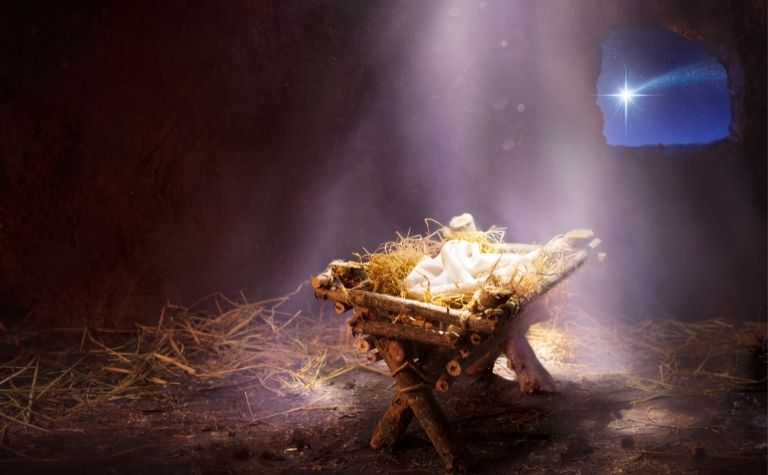When God sent his only son, Jesus Christ, into the world to seek and save the lost, it was the town of Bethlehem that first welcomed him. The hymn O Little Town of Bethlehem transports people back in time to the humble setting of Christ’s birth.
The imagery of the stars in the sky, a young woman, Mary, giving birth, and the hope of salvation permeate the lyrics of this timeless classic.
The unassuming town of Bethlehem was a perfect match for a humble Savior. The God-Man deserved the best that Earth had to offer, but he often got less than that — and at Calvary, he got its worst.
Yet his purpose wasn’t to be successful or powerful according to the world’s definitions, but to seek and save the lost. Christ arrived in Bethlehem, not for the healthy, but for the sick (Matt: 9:12).
Also see Advent Hymns for Christmas: 151 Seasonal Classics

Lyrics to the Advent Hymn O Little Town of Bethlehem
Certain phrases of the hymn O Little Town of Bethlehem have a way of embedding themselves in the hearts and minds of worshipers.
Lyrics like “the hopes and fears of all the years are met in thee tonight,” “while mortals sleep, the angels keep their watch of wond’ring love,” and “cast out our sin, and enter in, be born to us today” edify the soul long after Christmas trees and stockings are taken down.
| 1 O little town of Bethlehem, how still we see thee lie! Above thy deep and dreamless sleep the silent stars go by; yet in thy dark streets shineth the everlasting light. The hopes and fears of all the years are met in thee tonight. |
| 2 For Christ is born of Mary, and, gathered all above while mortals sleep, the angels keep their watch of wond’ring love. O morning stars, together proclaim the holy birth, and praises sing to God the King and peace to all the earth. |
| the wondrous gift is giv’n! So God imparts to human hearts the blessings of his heav’n. No ear may hear his coming, but in this world of sin, where meek souls will receive him, still the dear Christ enters in. |
| 4 O holy Child of Bethlehem, descend to us, we pray, cast out our sin and enter in, be born in us today. We hear the Christmas angels the great glad tidings tell; O come to us, abide with us, our Lord Immanuel! |
Praise is an important response to the incarnation. Yet, God wants more than our vocal harmonies, as wonderful as those sound to him. The truth is, he wants people to follow him with their entire lives.
Pastor Vance Havner writes, “Christmas is based on an exchange of gifts, the gift of God to man – His unspeakable gift of His Son, and the gift of man to God – when we present our bodies a living sacrifice.”
Also also O Come O Come Emmanuel for more.

Story of O Little Town of Bethlehem
In 1865, the year the Civil War ended and President Lincoln was assassinated, themes of peace and quiet would probably have been welcome to Americans.
In that year, the Rev. Phillips Brooks took a trip to Israel and saw Bethlehem and its surrounding fields on Christmas Eve, which eventually inspired him to write this Christmas hymn.
In contrast to some other Christmas hymns that emphasize the glory of God as seen in the grand chorus of angels, Brooks focuses on the quietness of Christ’s birth, and how little the larger world paid attention.
The final stanza is a prayer that Christ would come and be present with us. (From hymnary.org)
Also see The First Noel for more.

Advent: Meaning, Dates, and History
The word “Advent” comes from the Latin word Adventus, meaning a “coming” or “arrival.” It describes the ecclesiastical season immediately before Christmas.
In the Western world, Advent Sunday, i.e. the first day of Advent, is the Sunday nearest to Saint Andrew’s Day (i.e. Nov. 30). Four Sundays in Advent precede Christmas Day. In the East, Advent is longer, beginning in the middle of November.
Advent Sunday is traditionally the day on which the ecclesiastical year begins. The first clear references to the season in the West come from the latter half of the 6th century.
Advent is observed as a time or preparation for Christmas like Lent is for Easter.
Also see Come Thou Long-Expected Jesus for more.
Bible verses related to the hymn for Advent
- Matthew 2:1-2, “Now after Jesus was born in Bethlehem of Judea in the days of Herod the king, behold, wise men from the east came to Jerusalem, saying, “Where is he who has been born king of the Jews? For we saw his star when it rose and have come to worship him.”
- Luke 2:7, “And she gave birth to her firstborn son and wrapped him in swaddling cloths and laid him in a manger, because there was no place for them in the inn.”
- John 1:1, “In the beginning was the Word, and the Word was with God, and the Word was God.”
- John 3:16, “For God so loved the world, that he gave his only Son, that whoever believes in him should not perish but have eternal life.”
- Galatians 4:4, “But when the fullness of time had come, God sent forth his Son, born of woman, born under the law”
- Hebrews 1:3, “He is the radiance of the glory of God and the exact imprint of his nature, and he upholds the universe by the word of his power. After making purification for sins, he sat down at the right hand of the Majesty on high”
- Titus 2:14, “who gave himself for us to redeem us from all lawlessness and to purify for himself a people for his own possession who are zealous for good works.”
Please see related articles below

Related Articles
O Come, O Come Emmanuel is a beautiful Advent hymn that transports people back to ancient Israel before the time of Jesus Christ. It reflects the challenge of waiting for the arrival of the Messiah...
The Christmas season is full of festive music like the beloved Advent hymn, O Come, O Come, Emmanuel. Like the biblical stories that tell about the birth of Jesus Christ, the songs of Advent contain...
